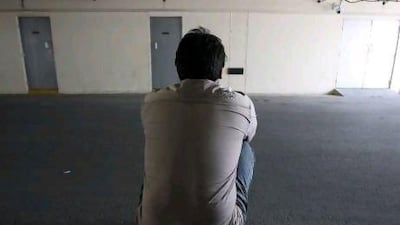DUBAI // A debtor who owes Dh90,000 that he cannot pay says he will sell one of his kidneys to avoid prison.
"This is not something I want to do but it is the only way out," the man, who says his name is Mohammed, said yesterday.
He said his problems began two years ago when he took out a bank loan to help his brother to buy a bus. Six months later his brother was killed in an accident and the vehicle was written off.
Mohammed says he lost his job a year ago, and with it any means of paying his debts. "This is not something I want to do but it is the only way out. It's been a crisis for me and my family after the death of my brother. I have to take care of his family and mine. Eleven people depend on me.
"It will soon be exam time and I need money for their school. We don't have a house, my family moves from place to place."
Selling or trafficking in organs is a criminal offence, but an advertisement was posted in January on the classifieds website Dubizzle by someone trying to sell a kidney. Dubizzle later removed the ad.
Mohammed Al Zaabi, a liver transplant specialist at Zayed Military Hospital, said: "Even just advertising this is wrong.
"And if it were possible to sell it, I don't think any doctors here would do the surgery. It's strictly prohibited and if anyone did it they would be punished severely."
The rules on organ donation are strict. Donors must be living relatives and require extensive psychological testing before approval is given.
As a result, there is a long list of people waiting for organ transplants. Dr Al Zaabi said there were about 1,000 people on dialysis, although not all of them required a transplant.
Saeed Al Shaikh, a consultant haematologist at Welcare Hospital, said many people from the UAE travelled abroad for black-market transplants.
"The number of people who do this is huge," he said. "People travel to Pakistan, India, the Philippines and China.
"There's a lot of problems from people who are returning with those kidneys. They are done on the black market, in suboptimal conditions. There are people who have died under our care because of serious infections."
Dr Al Shaikh said he knew of at least two cases of patients who died while taking immuno-suppressants after a botched transplant.
"If they get an infection from a dirty kidney and their immune system has been suppressed, of course they'll get serious infections and die," he said.
The UAE is working on a law that would allow transplants from corpses. Dr Ali Al Obaidli, consultant nephrologist at Sheikh Khalifa Medical City, said the new law, which he is helping to draft, will go some way to removing the temptation to seek organs from overseas.
"When something is not allowed in this country, we need to give viable options for people," Dr Al Obaidli said.
Dr Luc Noel, head of transplantation at the World Health Organisation, said transplants from cadavers were a more viable option than the current arrangement.
"It's never innocuous to remove an organ from someone who's alive," Dr Noel said.
Dr Al Shaikh also welcomed the proposal, and said it would go some way to meeting the demand for organs.
"There are plenty of people who are dying every day and their valuable organs are buried with them, with no use to anybody," he said. "This law will help a lot of sick people.
"If even 10 per cent of people who die in road accidents donated their organs that would be sufficient to get a good programme going."
Meanwhile, Mohammed admits he is worried about getting into trouble with the law but he feels he has little choice.
"I have to try to do something for the children. I have tried to work hard but nothing has worked out.
"I don't want any trouble, I don't want to create any problems. If I get into any trouble my family will be ruined. It will be the end of us."
* Additional reporting by Ramola Talwar Badam

